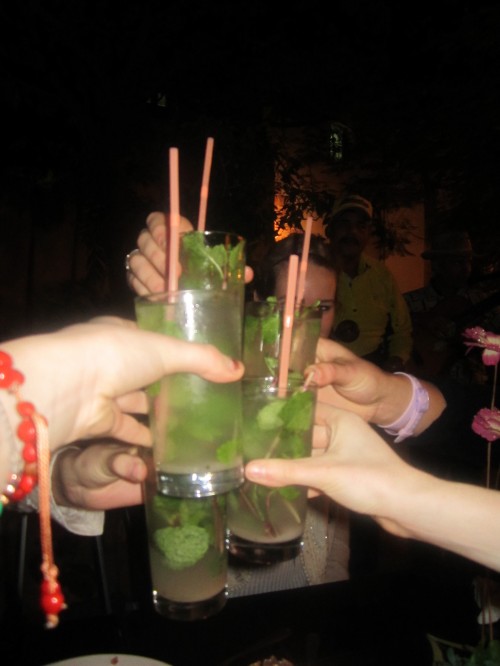Jinetero-ed up the…
April 29, 2012 by alcrook
Before heading to Cuba, our class studied jinterismo, a term that literally means “horse tamer” or ‘wrangler.” Jinterismo is most equivalent to the english term, “hustling,” specifically in the tourist industry, although it is heavily associated with prostitution. As a result of the economic crisis in Cuba, many Cubans have turned to jinterismo in order to earn precious CUCs from the incoming tourists hoping to gain an exciting Caribbean experience. According to the United States Department of State, a jinetero is a, “street “jockeys,” who specialize in swindling tourists. While most jineteros speak English and go out of their way to appear friendly… many are in fact professional criminals.” Although in class we talked about many of the stereotypes (i.e. racism and sexism), issues of authenticity and the economic necessity surrounding the jinetero and tourism industry, we did not heavily focus on the tourists who experience jineterismo. (Our group invented the verb form, jineteroed, to describe this experience.) Our class was warned that Cubans would offer to take us to places (clubs, restaurants, etc.) and would expect monetary compensation and that Cubans would ask us for things; however, I did not realize the extent to which our group would experience jineterismo.
My own experience with jineterismo in Cuba was extremely frustrating at the time, but in retrospect it was a good experience. While out for a brief walk before dinner in Havana (after having spent a few days in Havana), my roommate and I ran into a couple in the streets who began talking to us. The man spoke fair English (very impressive considering he taught himself) and his wife spoke only Spanish. However, between the Spanish of my roommate and I, we were able to have a very interesting conversation with them. After talking to them for a few minutes in the streets, they suggested that we go to dinner. We explained that we already had plans and only had a small amount of time and so we suggested drinks instead. He took us to a restaurant away from the tourist parts of Havana (although still only a few minutes walk from the Hotel Plaza). The couple told us we were going to have the best drinks in Cuba (what turned out to be only mojitos, although excellent mojitos). We ordered the drinks, six in total as both he and his wife felt entitled to a second drink, and began to have a conversation about various aspects of life in Cuba. We discussed the government, censorship, topics for my research paper, among other things. When we asked what the couple thought of tourism, they told us that they didn’t have a problem with it. I mentioned the economic benefits of bringing tourist dollars to Cuba and we were informed that, “The tourism industry doesn’t really affect us. All of the money just goes to the government. The average Cuban doesn’t get any money from the tourist industry.” To an extent, they are right. The money from the hotels in Old Havana goes into creating more hotels, not restoring housing, for example, in Old Havana. However, shortly after this conversation we received the bill for over fifty CUCs. Although this restaurant clearly was not a tourist place that traditionally accepted CUCs and this price was three times the amount a mojito should have cost, my feeble attempts to argue with the waiter were not helpful. As we begrudgingly pulled out the money for the most expensive conversation I have ever had, we were warmly told goodbye by the couple. His statement about not benefitting from tourists looked very foolish, but not as foolish as we felt as we walked back to the hotel. Lesson learned.
The jinetero industry is almost admirable, or perhaps interesting is a better word, when compared to begging. Cuba has an extremely low homeless population (very close to zero, some sources even claiming that homelessness is non-existent in Cuba). Although, we may not have noticed the absence (something far more difficult to notice than presence), there defiantly was an absence of a certain kind of person from the majority of the Cuban streets: beggars. We did experience some beggars, a large amount of people asking for pens (of all things), women asking for clothes, even the clothes off our backs, however, for the most part pure begging, especially for just money, was very minimal. It was most noticeable at Che Guevera’s grave, an obvious tourist hot spot where masses of tourist buses were constantly arriving and leaving. Cubans were actually more interesting in offering services than begging. There are clearing many downsides to this; however, at the very least it requires a skill set, whether that be hustling or an actual service, that simply begging does not. We were not dealing with uneducated, unintelligent people. The man from our excursion was currently enrolled at the university and the woman was a professor of salsa.
It is easy for the U.S. to categorize jineteros as criminals, and some are, but that is a broad definition that is lacking understanding of the economic situation, caused in a large part by the U.S. embargo. Jineterismo is a use of resources available to the Cubans. Cuba is lucky in comparison to the poverty of the Carribean. Cubans have enough access to education that they can communicate intelligently with tourists. They are wealthy (or not poor) enough to have a flourishing tourist industry. Our jinetero may have said that the tourism industry did not affect the average Cuban, an ironic statement coming form him, but this is not true. Cubans regrettably have (or choose) to turn to jineterismo to compensate for low wages, but this is valuable option that many impoverished people do not have. The option of jinterismo, of access to tourist dollars, is a privilege that does make an impact on average Cubans.
Sources:
http://xklsv.org/viewwiki.php?title=Jinetera
Leave a Reply
You must be logged in to post a comment.
